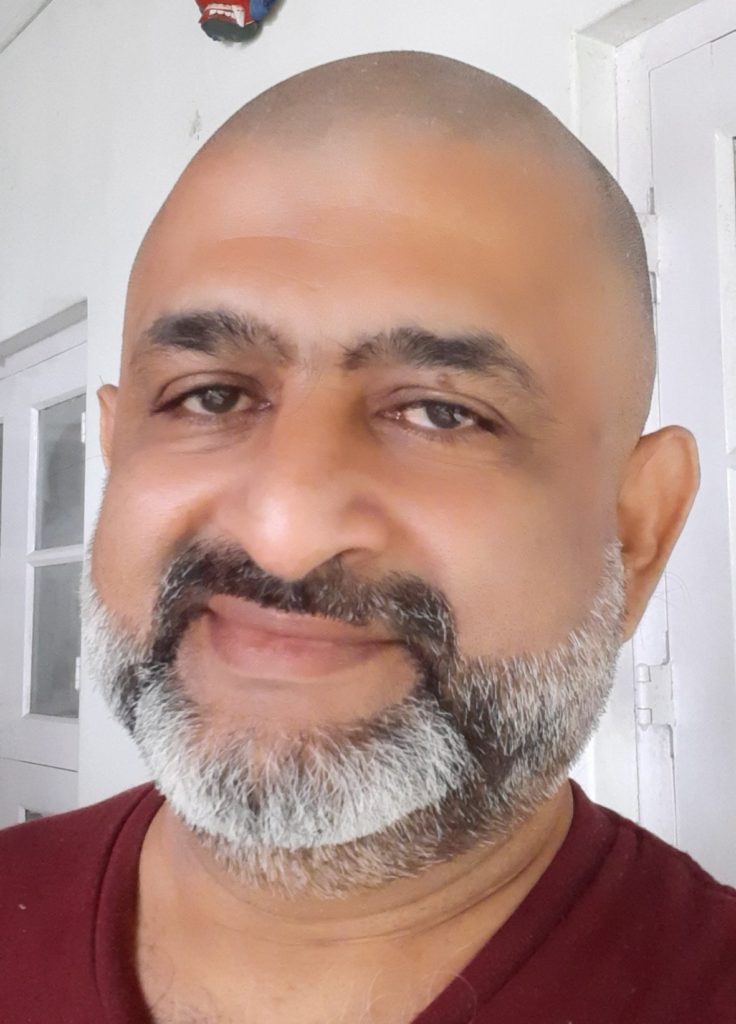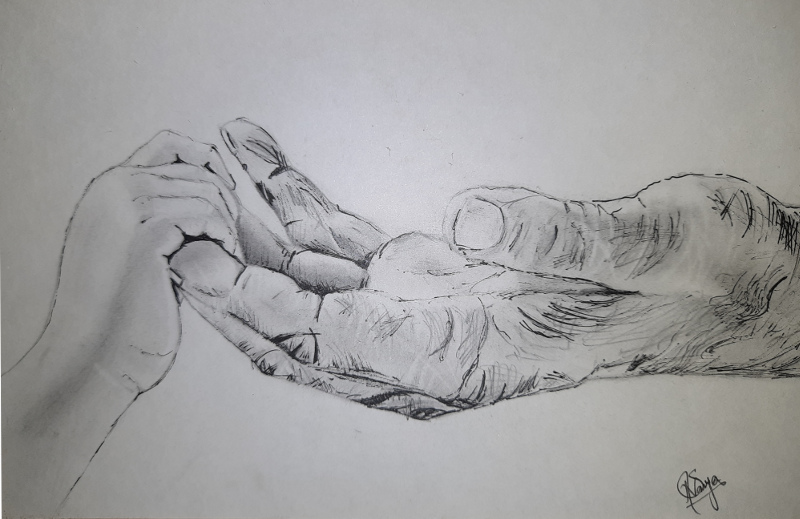When you just need someone to talk to…
Mathai Baker Fenn PhD – IIT Bombay

40 years since I started my journey in Psychology, I have earned a PhD from one of India’s well-known colleges and decades of experience teaching and practising psychology across India and abroad. As a coach, my approach integrates insights from Indian Spirituality, Cognitive, Existential and Gestalt Psychology to re-examine how we live our lives.
Being born in a family of practising Christians in a predominantly Hindu country has given me a unique perspective on the spiritual journey we must all make through this life. If you would just like to talk to someone about spirituality, psychology, philosophy or life in general, do drop me a line (mathai@thetalkshop.in).
@ $50 (USD) an hour, you choose how confidential you want it to be.
Sign up for a no obligation free exploratory session. > Click Here
Work or life? Is there a difference these days?

It’s not always enough to read a book or to join a class. Sometimes you need someone to talk to, someone who will listen to you and who takes a personal interest in you. This is especially true when you feel everyone else around you have already picked a side or have strong opinions of their own.
The world of business has long recognized that a coach can be very useful if you want to know more, perhaps a good place to start is this (HBR 2019 article). A coach is committed to trying to understand you and your way of looking at things, rather than suggest quick fixes, so the coaching engagement may take a bit of time before you hit the sweet spot and you begin to see the benefits.
How is coaching different from therapy? (What to expect)
- Every relationship is different. I find some clients expect a structured approach so that they know exactly where they are and where it’s all going at any time. Others prefer a more unstructured approach that helps them discuss whatever is uppermost in their mind. I do both. Both work, but in my approach, the unstructured has a deeper impact although it requires a bit more maturity from the client. We will discuss how much structure you need before we start. We will discuss how much structure you need in the first session, beyond that you have the right to stop at any point and ask ” I am confused, where is all this going?” and it is my responsibility to answer that.
- Counselling is often offered to people who have problems functioning in normal society, while even top performers can benefit from a coach.
- A counsellor will listen to your problem and try to help you overcome your problem. The coach, on the other hand, challenges you to be more than you are.
- Carl Rogers describes counselling as a client-centred and non-directive approach (read about his approach on Psychology Today by clicking here). This means it is the client who sets the agenda. In coaching, your coach may have a program that can help you achieve your objectives.
- CAVEAT: I am not bound by the strict codes prescribed by professional bodies. Our conversations do not constitute therapy. Conversations are just conversations, but sometimes that’s exactly what you need…
- Sessions are scheduled in advance for blocks of one hour. A one-on-one session this season costs $50 per hour. We can talk on Whatsapp, Telegram, Zoom or Google Meet.
- . Once we have had a preliminary conversation (which is free), you can buy a block by paying for four sessions (for a month) by paying $200/- This helps by reserving a weekly slot. To reserve slots, email me at mathai@thetalkshop.in. There is no refund for missed sessions. This is to discourage cancellations without a significant reason.
How do you choose a good coach? Am I right for you?
Most people find a good coach through a reference from somebody they know. For others, this is not always an option. Sometimes well-intentioned coaches can do harm (HBR 2002). Of course, like a doctor who works with patients, there is no way we can guarantee the outcome, but having the right background helps. My own journey goes deeper than just Psychology. My PhD explored psychology and philosophy. My interest in personal growth is invariably linked to Spirituality both in the eastern and western traditions. So we could discuss that too if you ever wonder about the larger picture.
I am primarily a Cognitive Psychologist, and although I have not worked professionally as a Clinical Psychologist, helping people achieve their potential has always been my real passion. In 1995, my friend Shobha Prasad (LinkedIn Profile) suggested: “Mathai it seems to me that your real passion is in helping people, why don’t you build a career from that?” She was right, but I found the medical model very restrictive, so despite a keen interest in Psychology and a PhD, I chose not to work in the clinical setting.
Although my Psychology background helps me understand personal issues, decades of experience teaching management helps me understand work contexts too. It’s not all academic knowledge either. Having had varied experiences of my own, including as an entrepreneur, helps me to understand life and work situations, too. For a more detailed description of me, click here.
My Approach
While it is not necessary that you understand everything about my approach, it does help if we both have a basic agreement on the way forward. I believe that we make mental models of the world around us. These models are necessary simplifications that allow us to break down the complexity of the world to enable us to successfully adapt and live in the world. However, sometimes our mental model becomes rigid (locked) and no longer reflects the present reality we live in. Sometimes a significant event or experience may create an unrealistically biased model. In such cases, it becomes necessary to disassemble it and allow new ones to emerge. Because we can become emotionally invested/attached to our mental models, sometimes it is hard and painful to let them go. To learn more about the theory that informs my work, browse through the Talk Shop Library, especially this pdf document on Gestalts.
I believe that we all play different roles in society. Sometimes we play a role during specific times, for example when a doctor is in the hospital she is treating patients, but when she is at home, she may be a mother, a daughter and a wife. Sometimes we play more than one role at the same time. In his 1959 book, The Presentation of Self in Everyday Life (goodreads.com), Erwing Goffman describes society using the metaphor of the theatre. C.G. Jung borrowed the world Persona from theatre, where it was used to describe masks. Yet this metaphor raises an interesting question. Who is the person behind the masks? The actor acting the different social roles we play? The metaphor of the theatre also tells us not to take life too seriously, to take a playful approach (Dr. Mathai Fenn, YouTube) and try out things. Try changing things around. You may find it difficult in the beginning.
Creating the Space Online
Just because communication happens online it doesn’t mean that you are talking to a machine, although, if you wanted to, you could try that out, too (click here to try out the Eliza program, which was at one point a popular automated counselling program). Speaking to an online coach is just like talking to a colleague or friend online. It’s just a channel of communication. In order to achieve its objectives, it is important to create a Safe Open Space where a person can ask or say anything without fear or shame. Carl Rogers calls this “Unconditional Positive Regard”. Under such circumstances, a person feels strong enough to take apart their own ways of seeing and interacting with the world (Gestalts). This is easier if there is an agreement about the basics. This is especially important because different people with different theoretical approaches have their own methods.
Benefits of online coaching :
- It is cheaper because there is no travel involved and hence greater efficiency
- You no longer have to choose a coach based on who is available in your locality.
- Works during a lock-down and other disruptions
- Since you can engage in sessions from your own home, its easier to build a relaxed relationship, no need to dress up and go out
- Even when you are travelling you can still connect
- You can choose what you want to reveal like details about your personal life, etc.
- It is as discrete/confidential as you want it to be, it’s up to you, whether you want to tell your friends and family. We can even work without you revealing your identity.
- A coach is not bound by the strict rules that apply to a Psychotherapist or Clinical Psychologist
- As is true in the case of many relationships, it’s sometimes easier to connect online.
How does it work?
- Besides applying for coaching, look around this site (Check out our Library and the courses we offer), join a course, getting to know me better will help you decide, rather than just start talking with a stranger.
- Send an email to mathai@thetalkshop.in with “Coaching Request” as the title or whatsapp/call/message. In the body of the email explain a bit about yourself and the reason why you would like me to be your coach.
- You receive a reply with an agreement that you have to read and agree to.
- Make the payment: Online Coaching sessions cost $50 (USD) or its equivalent, per hour when purchased in blocks of 4 hours each. Details of how to make the payment will be sent to you via email. Please note that the purchase of a block is non-refundable even if you decide to terminate after one hour. This is to discourage hasty, short-term decisions which could jeopardize the coaching process.
- . During the initial session, I will listen to you and your situation, then I will explain what you can expect from our engagement. If you decide to go ahead, you can purchase a block of four hours.
- The initial part of the relationship is about getting to know each other. It helps me to understand your context and your aspirations, it also helps you to understand my approach. The initial sessions will depend on you and how comfortable are you in opening up. Some people find it hard to start talking, if that describes you, I may ask you questions. At any point in the conversation, if you feel that you need to ask/say something, feel free to interrupt or even terminate.
- Phase 2 often involves some changes you can implement in your life. Depending on your needs and your situation, we may start with small changes. However, if the situation calls for it, we may also try to make larger changes.
- Phase 3 is about learning to experiment with life, as you feel greater control/power over your life.
- When does it end? For some coaching is rewarding in the long term. For others, it is required to tide over an immediate challenge they face. It is not unusual for those who belong to the second category to re-engage whenever they need to later on.
No coach has ever won a game by what he knows; it’s what his players know that counts.
Thomas G Brandy (goodreads)